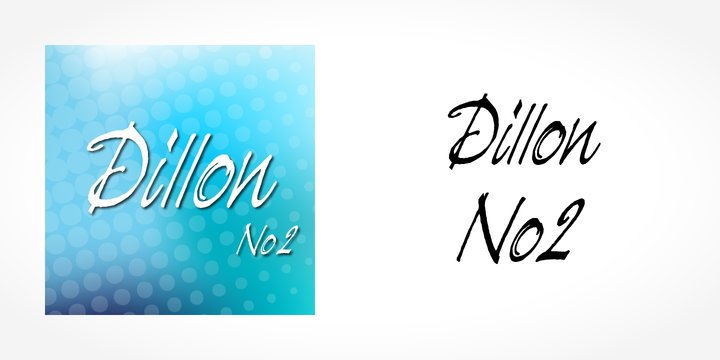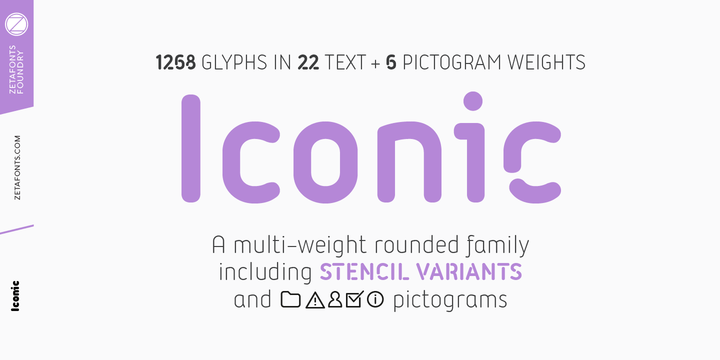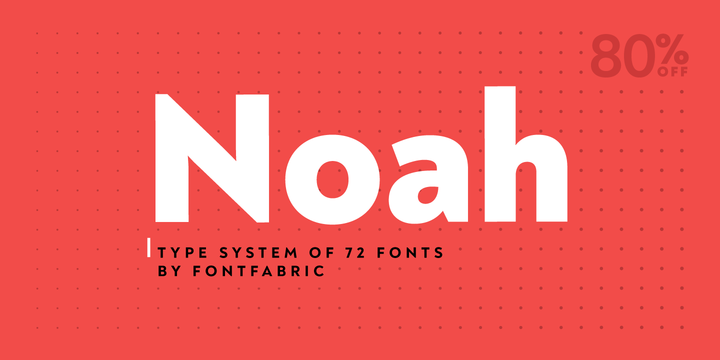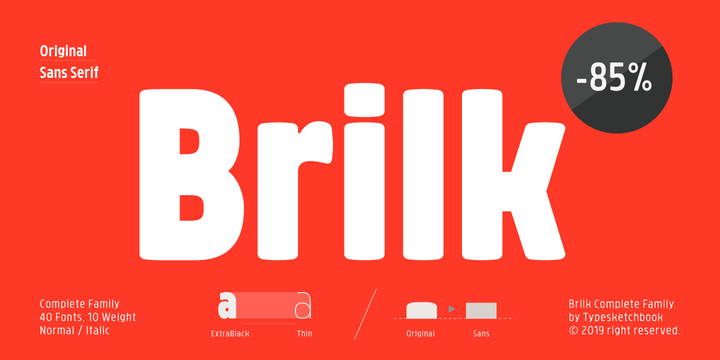
Dillon No2 is a typeface published by SoftMaker.

Iconic is a rounded condensed sans serif typeface designed by Andrea Tartarelli together with Cosimo Lorenzo Pancini and Francesco Canovaro at Zetafonts. It’s a multi-purpose workhorse family designed for clear and effective editorial, interface and information design with minimum usage of space. The soft, rounded shapes are all derived from basic circular geometry, but slight humanist touches have been added to make the family look more informal and readable. With his slim, minimal aesthetic, Iconic embodies the spirit of contemporary tech, and the desire for an effortless, natural digital experience. The extensive range of weights allows both for text and display usage. In body copy Iconic excels in clarity from light to bold with a choice of medium and regular for text appearance fine tuning; in display use it allows endless design expressions with a range that goes from the hairline thin weight to the super-fat heavy, all with matching italics. To complement the basic, regular shapes of the Iconic family, a Stencil subfamily has been designed with a more aggressive technical look. Perfect for wayfinding, branding and interaction design, the six Stencil weights can also be used next to the base family for a rich textural approach to type setting. Both Iconic and Iconic Stencil feature an extended character set of over 1200 glyphs that covers over 220 languages using the Latin alphabet, as well as Greek and Russian Cyrillic. Open type features include small caps, positional figures, alternate letter forms, stylistic sets, arrows and extra punctuation and discretionary ligatures. A six-weight icon set, Iconic Pictograms, has been also developed in matching weights to the base family to allow maximum control over the design of digital interfaces using Iconic.

Noah is not just another geometric sans but rather extending the limits of the x-height for a further flexibility of a typeface. This type family encompasses 72 fonts grouped into four subfamilies with different x-heights — starting from the lowest one Noah Grotesque through Noah and Noah Text to the highest one Noah Head — all they including styles from Thin to Black with matching true italics.
The geometric structure combined with normal width proportions, moderate contrast and vertical stress make this type family suitable for various typographic usages whereas the enhanced legibility of Noah Text optimizes it perfectly for long texts, and Noah Head intended for strong headlines. Sharp details, terminals with humanistic flavor and typographic alternates of letters, such as the binocular “g” or the geometric “a” successfully blend the best aspects of both geometric and grotesque typeface classics.
The underlying flawless functionality show coverage of Extended Latin and Cyrillic with span for more than 130 languages; support of many OpenType features, such as localizations, tabular numerals, inferiors and superiors, numerators and denominators, fractions, standard and discretionary ligatures, case sensitivity etc.
The versatile characteristics of Noah type family are solution for every design challenge.
Designers: Svet Simov, Radomir Tinkov, Stan Partalev
Features:
• Over 650 glyphs in 72 styles (Thin to Black)
• Extended Latin and Cyrillic scripts for more than 130 languages;
• 4 different x-heights;
• Normal width proportions;
• Moderate contrast and vertical stress;
• Geometric characteristics and terminals with humanistic flavor;

The TT Tsars font family is a collection of serif display titling fonts that are stylized to resemble the fonts of the beginning, the middle and the end of the XVIII century. The project is based on title fonts, that is, the fonts that were used to design book title pages. The idea for the project TT Tsars was born after a small study of the historical development of the Cyrillic type and is also based on Abram Shchitsgal’s book “Russian Civil Type”.
At the very beginning of the project, we had developed a basic universal skeleton for the forms of all characters in all subfamilies of the family, and later on we added styles, visual features, artefacts and other nuances typical of the given period onto the skeleton. Yes, from the historical accuracy point of view it might be that such an approach is not always justified, but we have achieved our goal and as a result we have created perfectly combinable serifs that can be used to style an inscription for a certain time period.
The TT Tsars font family consists of 20 fonts: 5 separate subfamilies, each of which consists of 4 fonts. Each font contains 580 glyphs, except for the TT Tsars E subfamily, in which each font consists of 464 characters. Instead of lowercase characters in the typeface, small capitals are used, which also suggests that the typeface is rather a display than text one. In TT Tsars you can find a large number of ligatures (for Latin and Cyrillic alphabets), arrows and many useful OpenType features, such as: frac, ordn, sinf, sups, numr, dnom, case, onum, tnum, pnum, lnum, salt (ss01), dlig.
Time-related characteristics of the subfamilies are distributed as follows:
• TT Tsars A—the beginning of the 18th century (Latin and Cyrillic)
• TT Tsars B—the beginning of the 18th century (Latin and Cyrillic)
• TT Tsars C—the middle of 18th century (Latin and Cyrillic)
• TT Tsars D—the end of the 18th century (Latin and Cyrillic)
• TT Tsars E—conditionally the beginning of the 18th century (only Latin)
TT Tsars A and TT Tsars B families (both the beginning of the 18th century) have different starting points: for TT Tsars A it is Latin, for TT Tsars B it is Cyrillic. The development of the TT Tsars A family began in Latin, the font is based on the royal serif Romain du Roi. Cyrillic alphabet is harmoniously matched to the Latin. The development of the TT Tsars B family began in Cyrillic, which is based on a Russian civil type. Characteristic elements are the curved one-sided serifs of triangular characters (A, X, Y), drops appear in the letter Ж, the middle strokes В and P are adjacent to the main stroke. Latin was drawn to pair with Cyrillic. It is still based on the royal serif, but somewhat changed: the letters B and P are closed, and the upper bar of the letter A rose. This was done for the visual combination of Cyrillic and Latin and at the same time to make a distinction between TT Tsars A and TT Tsars B.
TT Tsars C is now the middle of the 18th century. Cyrillic alphabet itself did not stand still and evolved, and by the middle of the 18th century its forms have changed and become to look the way they are shown in this font family. Latin forms are following the Cyrillic. The figures are also slightly modified and adapted to the type design. In TT Tsars C, Cyrillic and Latin characters are created in parallel. A distinctive feature of the Cyrillic alphabet in TT Tsars C is the residual influence of the flat pen. This is noticeable in such signs as З, Ж, K. The shape of the letters Р, Ц, Щ, Э is very characteristic of the period. In the Latin alphabet, a characteristic leg appears at the letter R. For both languages, there is a typical C characterised by an upper serif and the appearance of large, even somewhat bolding serifs on horizontals (T, E, Г, L).
TT Tsars D is already the end of the 18th century, when with the development of printing, the forms of some Cyrillic characters had changed and turned into new skeletons of letters that we transposed into Latin. The figures were also stylized. In this font, both Cyrillic and Latin are stylistically executed with different serifs and are thus logically separated. The end of the century is characterized by the reduction of decorative elements. Straight, blueprint-like legs of the letters Я, R, K, Ж. Serifs are very pronounced and triangular. E and Э are one-sided on the middle horizontal line. A very characteristic C with two serifs appears in the Latin alphabet.
TT Tsars E is a steampunk fantasy typeface, its theme is a Latinized Russian Сivil type (also referred to as Grazhdansky type which emerged after Peter the Great’s language reform), which includes only the Latin alphabet. There is no historical analogue to this typeface, it is exclusively our reflections on the topic of what would have happened if the civil font had developed further and received a Latin counterpart. We imagined such a situation in which the civil type was exported to Europe and began to live its own life.

Brilk is a condensed Sans-serif typeface made up of 40 fonts across 10 weights with normal and Sans-serif options.
It’s a unique and modern sans typeface, which is well suited for a variety of typographic applications such as headlines and small texts. The Brilk font family supports multiple languages and is available as both webfont and desktop font.
©
Alica Don
2014 . Powered by
Blogger
Blogger Templates
.
.